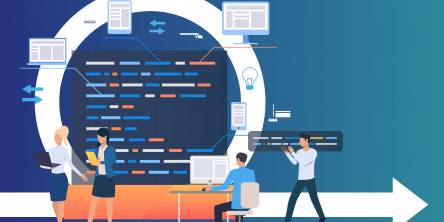Outsourcing Mobile App Development: Things to Keep in Mind
According to a recent study, the world is well on its way to having more than six billion smartphone users across the globe by next year. Researchers are also of the opinion that by 2022, the number of total app downloads is likely to be as much as 258.2 billion. If nothing else, these figures serve to show that the mobile app industry is poised to observe even more robust growth in the future. So, what does this mean for businesses? Well, among other things -- a cost-effective and efficacious way to develop mobile apps. That method and the world agrees is outsourcing.
Why? Well, because it has far too many benefits. For starters, it helps companies significantly cut reduce their overall costs. Then there's also the fact that outsourcing mobile app development allows the company to achieve a quicker time-to-market. Moreover, if you thought that that's all it has to offer, you'd be wrong. Outsourcing also gives unfettered access to a vast pool of accomplished professionals who have the skills required for the successful execution of your development project. Also, let's not forget that it also gives you access to consistent as well as persistent to round-the-clock support and assistance with maintenance.
With that being said, there's a good chance that you either lack the expertise or the time needed to build an app. It means that you will most definitely need to turn to an external source of assistance, such as an app development company. Therefore, it is essential that you pay your attention to the process as well as the vendor you shortlist. To help you with that, here's a list of some factors you should reflect on before you outsource your mobile app development project.
- Understand your business' needs: You wouldn't believe just how many companies forget to evaluate their business requirements before taking a decision. Nonetheless, this should be the starting point in the process. So, be sure to outline the primary aim that the mobile app will fulfill and don't forget to be precise about your needs.
- Understand the budget: It is essential to understand that mobile app development costs are based on the features integrated into the app and also by its category. So, it would be prudent to check out other apps in the group you are targeting and also factor in the intricacy involved in the development of your app. This way, you will have a clearer picture of the kind of budget you will need for it.
- Check if the vendor outsources: You may not realize this at first, but several vendors in the market are necessarily just middlemen; they acquire a contract and then outsource it to someone else. You may not have an issue with that, but it is vital to clarify this before you start working with them. Among other things, it will help you gauge the transparency of your selected vendor's operations.
- Clarify who owns the rights to the code: Who owns the code is a critical part of the process, so it is imperative this part of the conversation is clarified before initiating the development process. Moreover, if the vendor wants to own the code, the most important ramification is that you will end being dependent on them for all maintenance needs as well as any updates for the app. Then there are also the legal ramifications of code ownership. Long story short, no matter what you decide, be sure to state it explicitly and see to it that it is included in the contract.
There is no doubt that a software development company partnership brings an abundance of benefits with it. However, to ensure the success of this endeavor, you'd do well to keep the factors above in mind.
Similar Articles
Unless you have been hiding in a cave somewhere, you would know and realize that the world is creating information at a stunning speed. While it is genuinely considered normal information that said data can now be turned into the groundwork of achievement for essentially any business in the present day and age.
Software development refers to the procedure of constituting and nourishing software applications. This provokes the utilization of many fundamentals and practices. Software development targets constitute structured, dependable, and beneficial software.
Designing a data warehouse is a strategic activity that builds the groundwork for strong data management and analytics capabilities within a business. In today's data-driven world, the systematic creation of a data warehouse is not only a technical requirement but also a critical step in harnessing the power of information for informed decision-making.
The integration of Internet of Things (IoT) technology into the construction and real estate sectors, which include buildings, infrastructure, homes, and businesses, is predicted to increase dramatically in the future. Despite this predicted expansion, the construction industry is behind other industries in terms of IoT adoption.
In this dynamic world of innovative and transformative technology, the use of Minimum Viable Product (MVP) has proven to be a winning strategy for success.
While monolithic applications may have waned in popularity during the era dominated by the cloud and microservices, interest is resurgent. Organizations, in considering their position on the application modularity spectrum, are now examining both the advantages and drawbacks of relying on microservices.
Data visualization is an indispensable tool that allows us to transform raw, and often unstructured data into insightful visuals, identify patterns, and communicate these insights to the wider audience and stakeholders.
For modern businesses to thrive, ensuring the effective management of inventory stands has become vitally important. Inventory management stands as a cornerstone of success. And the emergence of the Internet of Things (IoT) has introduced a new era of connectivity and efficiency across diverse industries.
Do you know what the following e-commerce companies have in common: Amazon, Walmart, eBay, and more? All of these e-commerce companies' apps make use of Java. Java is decidedly among the leading choices of programming language for e-commerce applications because it offers a world of benefits; for example, since Java code can be run on any platform with a Java Virtual Machine (JVM), users of e-commerce apps made with Java can access the said apps on a variety of devices.








